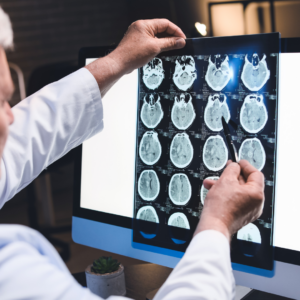Accidents happen. Maybe you were playing a contact sport and got hit by another player, or you fell at work and bumped your head. Perhaps you were in a car accident and hit your head against the steering wheel. No matter what happened, it can be difficult to know when you’re exhibiting the symptoms of concussion.
Any time you hit your head and have a loss of consciousness, blurry vision, or a headache that won’t go away with pain medication, you should seek medical care. If you suspect you or a loved one are suffering from a concussion, consider the following elements.
According to the Mayo Clinic, a concussion is “a mild traumatic brain injury that affects brain function.” These injuries are often caused by a blow, jolt, or impact on the head, but not all people who experience this will get a concussion.
Concussions are often broken down into three categories by healthcare professionals. They include:
 Grade 1 mild concussion: Grade 1 concussions are the mildest form of concussion and involve symptoms that last less than 15 minutes and do not cause loss of consciousness.
Grade 1 mild concussion: Grade 1 concussions are the mildest form of concussion and involve symptoms that last less than 15 minutes and do not cause loss of consciousness.Because many of the symptoms of each type of concussion overlap, it is important to meet with a concussion specialist who can evaluate your mental status and provide a thorough physical exam.
Your skull acts as a protective barrier to your brain, with the fluid surrounding the brain as a cushion from injuries. However, when you take a hard hit, causing your brain to jolt within your skull, these blast injuries can cause trauma in the form of a concussion.
It is estimated that between 1.7 and 3 million sports- and recreation-related concussions happen each year. Slip and falls are the second leading cause of spinal cord injuries and head trauma.
Despite how common concussions are, five in 10 concussions will go undetected or unreported to medical professionals.
Common causes of concussions that require emergency treatment include:
While accidents can happen, if the concussion results from negligence, you have a right to take legal action. For example, if a child gets hit during a football game and complains of a headache and double vision afterward, but the coach still makes the child engage in physical activity, worsening concussion symptoms, you may have a right to a legal claim.
Or, if an elderly loved one is a victim of nursing home abuse, which has caused them to suffer physical trauma and memory loss, you may have a personal injury claim.
Regan Zambri Long can guide you through the legal process if your loved one’s concussion is a result of negligence.
The American Brain Foundation defines a traumatic brain injury (TBI) as sudden trauma or damage to the brain, usually from blows to the head or violent jolts. A TBI can be caused by a closed injury from blunt force trauma where the skull remains intact or an open injury when the skull is pierced and the brain tissue is damaged as a result.
Traumatic brain injuries are divided into two categories: primary TBI and secondary TBI. A primary TBI occurs when the victim experiences signs of concussion right away at the time of the accident. Secondary traumatic brain injuries do not show the common symptoms right away; instead, they evolve with time, typically within hours to days after the accident.
Concussion victims must also be mindful of post-concussion syndrome, which occurs when the symptoms of a concussion last longer than expected.
The symptoms of concussion include physical, emotional, and cognitive impacts. Depending on the victim’s age, how these symptoms manifest can vary. For example, young children with concussions may say they don’t feel good, whereas older adults may explain they have a severe headache and blurred vision.
Anytime someone experiences a jolt to their head and expresses concussion signs, you must get them urgent care.
Often the physical symptoms are what serve as indicators that something is wrong. Some of the most common physical signs of a concussion include:
 Headache
HeadacheThe type of injury will ultimately determine the severity of these physical symptoms and how long they will persist.
When a concussion impacts someone’s mental activity, the symptoms may not be as apparent right away. Emotional and cognitive symptoms of a concussion include:
Depending on the types of concussion suffered or the age of the injury victim will determine how severe these common concussion symptoms may present. If a loved one experiences any of the physical, emotional, or cognitive symptoms following the initial injury or in the hours and days following, go to your nearest emergency department for medical care.
In most current health topics, we talk about the importance of early detection. However, for people with concussions, early detection and intervention are critical to the long-term implications of the injury.
When it comes to the management of concussion, recognizing the symptoms early will result in the followin:
Even minor head injuries can result in catastrophic consequences like blood clots, increased intracranial pressure, and decreased cognitive function.
It is critical that anytime you experience a blow or jolt to the head that causes you to lose consciousness, you follow concussion protocols and seek medical attention. Further, seek medical care immediately if you experience the following symptoms.
These symptoms can be a sign of a serious brain injury and require concussion testing.
The aftercare for a concussion may vary depending on the severity of the brain injury. However, recovery treatment is often broken down into three categories.
However, follow the guidelines your healthcare provider gives you.
The acute symptomatic phase begins at the time of the injury and the emergence of symptoms to the time symptoms start to subside. Typically, it will only last three days or less, but if new symptoms emerge or you are not improving, seek medical attention.
During this phase, you must have complete rest for a day or more. Following this, you may resume light thinking and physical activity. This includes limited screen time, short walks, etc.
For the first 24 hours, avoid medications that may cause bleeding, such as aspirin, ibuprofen, and naproxen sodium. Acetaminophen is fine for pain relief in most cases.
During the recovery phase, you may be able to tolerate more physical activity and thinking, but symptoms may flare when engaging in these behaviors. Gradually resume daily activities, but contact your doctor if symptoms worsen and do not improve.
When you no longer experience concussion symptoms, you are considered recovered and able to engage in typical activities with doctor approval.
But, if you have prolonged complications, call your doctor right away.
Be it a motor vehicle accident, injury from a recreational activity like a sport, or a slip and fall, if you suffered a concussion or other head injury because of someone’s negligence, you must fight for your legal rights.
At Regan Zambri Long, our Washington, DC concussion injury lawyers will fight for you or your loved one by:
 Establishing the cause of your concussion. We’ll interview witnesses, speak with medical professionals, and determine what happened.
Establishing the cause of your concussion. We’ll interview witnesses, speak with medical professionals, and determine what happened.If you or a loved one were hurt and have symptoms of a concussion, seek immediate medical attention. Then call Regan Zambri Long for a no-obligation, free consultation.